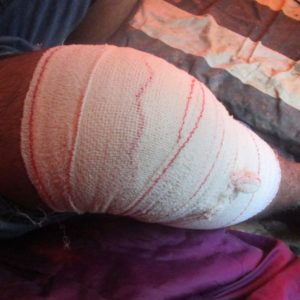The respondent was part of a group of 25 people, Afghans and Pakistanis, who were walking for three days in the Croatian countryside. The incident involved the respondent and two other young males who were caught, just south of the border of Croatia-Slovenia. The larger group were spotted attempting to cross the stretch of river, protected by a border fence.
The police spotted the interviewee and his companions by the river and began to shout at them. The group were scared and fled into the nearby woodland (back into the Croatian interior). It was dark and hard to see anything in the forest. The group became dispersed and consequently the respondent and two other young males were caught.
They saw a police officer in the trees pointing a gun at them, which the victim described as a military style rifle. The officer was dressed in a black uniform and shouted at them to “stop”. They complied with the order and froze, waiting for the police to arrive to their position. There were two officers present during this encounter, the first being joined by a border officer dressed in blue who handcuffed the three men and pushed them out of the woods.
By the road they found more cars, presumably used by the officers who were in pursuit of the other 22 men who fled from the scene. There were four smaller jeep-type vehicles and one large van. The respondent and his companions were put into the back of the van, with no windows or ventilation.
It was dark inside, and they couldn’t breathe properly. He described how the driver veered from side to side, even though the road was straight, just to induce car sickness and nausea. The van delivered the victim and the other two young men to a border area they knew to be on the outskirts of Maljevac. He identified 6/7 male police officers waiting for them (one in the distinctive blue of the border police). The respondent describes how it was hard to tell because they were brought from the van one-by-one. The police, dressed in black uniforms, beat them individually with electronically charged batons.
The respondent was assaulted heavily to the knee which is now almost immobilised. He was also struck across the back of the head and pushed to the floor. The beating lasted for approximately 20 minutes, during which the police forced them to empty their pockets and stole all three of the men’s phones, power bank’s and even their energy drinks.
The three addressed the police in English, but the officers only replied telling them to “shut up”, and referred to them as “pičku materi”. Throughout the attack, they were handcuffed and incapacitated.
The officers did not take their names, fingerprints, or give them any documents to sign. But as a final indignity, the policeman made the three men clean rubbish from the back of the van. They shouted at them and pushed them towards the rear of the van and forced them to collect the accumulated garbage that had been sat in the back of the vehicle, including food packaging, empty water bottles and random trash. The three men asked for something to eat and some water, but the officers denied them refreshment and continued to force them to clean, even though their hands were bound.
Eventually they were released, but only to allow the officers to chase them towards Bosnian territory. This occurred 2 kilometres from the main official border crossing by road in to V. Kladusa.
The officers who caught the three men in the Croatian/Slovenian border area were dressed in black uniforms. They were armed with military style rifles, and drove jeeps (along with one van for transporting the victims). At the border the perpetrators were equipped with electronic batons which they used to beat the victims. One border police officer was also witness to the incident.
The right knee of the respondent was bruised and suffered ligament damage from the impact of the blows. He attended the MSF clinic in V. Kladusa in order to have it bandaged. The respondent remained in considerable pain, even with the pain relief offered to him by the doctors.

